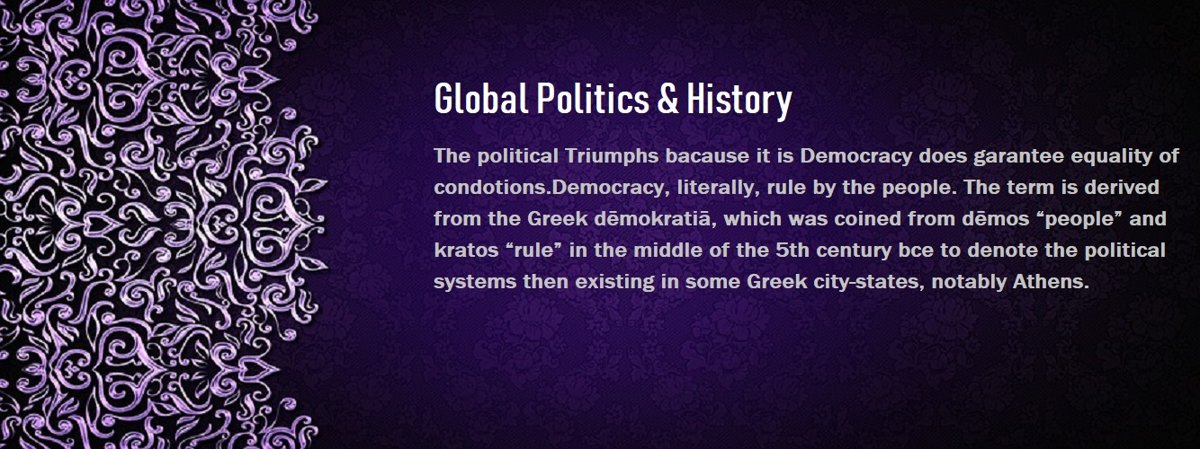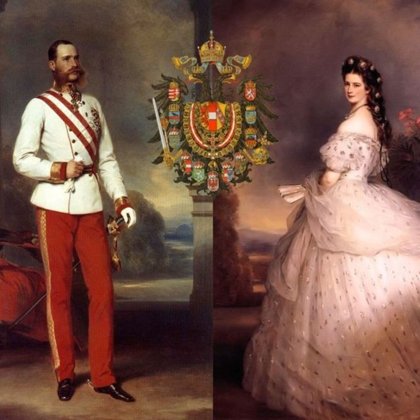FRANCIS JOSEPH I OF AUSTRIA (1830 – 1916) AND HIS WIFE EMPRESS ELISABETH OF AUSTRIA (SISSI,1837 – 1898) :THE MOST BELOVED EMPEROR AND EMPRESS OF HABSBURG MONARCHY. FRANCIS JOSEPH WAS TROUBLED BY NATIONALISM DURING HIS ENTIRE REIGN.HE CONCLUDED THE ASTRO - HUNGARIAN COMPROMISE OF 1867,WHICH TRANSFORMED THE AUSTRIAN EMPIRE INTO THE ASTRO - HUNGARIAN EMPIRE,UNDER HIS DUAL MONARCHY.
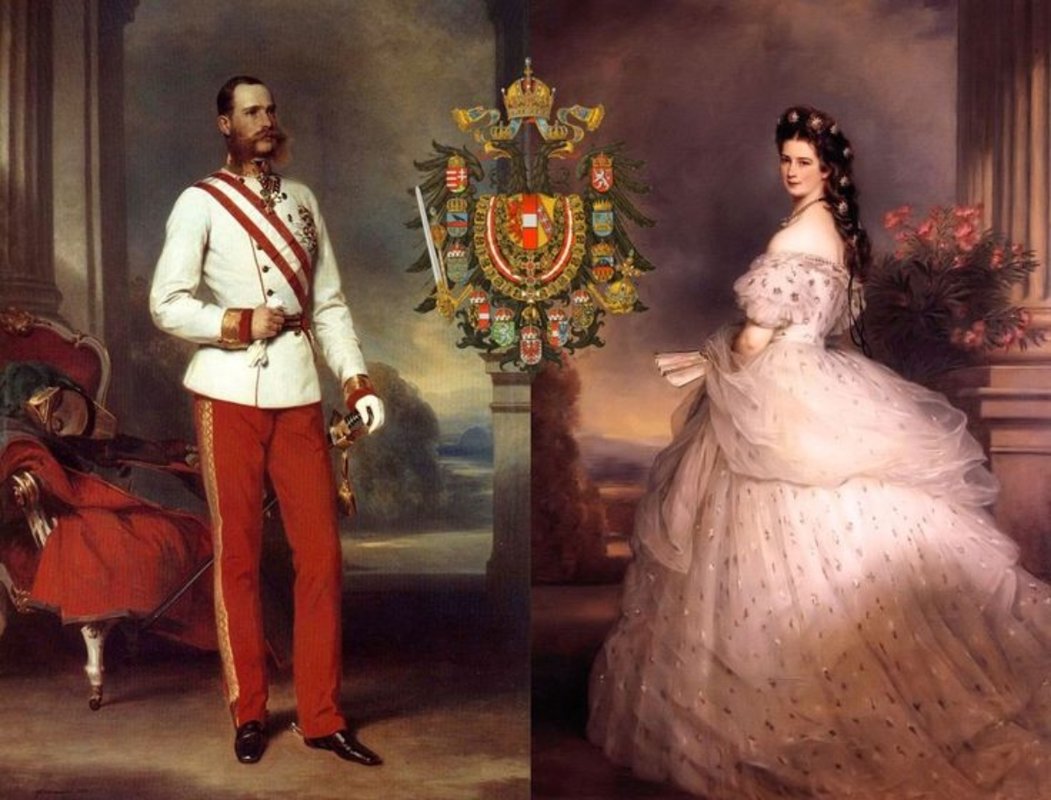 Franz Joseph and Elisabeth, the ‘perfect couple’ of the Austrian monarchy, have gone down more in the annals of popular literature than in history. The emperor falls in love with a beautiful young princess Sissi and takes her back to his palace, such is the stuff of fairytales.This did not sit well with Franz Joseph’s most powerful advisor,his mother. Franz Joseph I,the third longest reigning European monarch (67 years).
Franz Joseph and Elisabeth, the ‘perfect couple’ of the Austrian monarchy, have gone down more in the annals of popular literature than in history. The emperor falls in love with a beautiful young princess Sissi and takes her back to his palace, such is the stuff of fairytales.This did not sit well with Franz Joseph’s most powerful advisor,his mother. Franz Joseph I,the third longest reigning European monarch (67 years).
Franz Joseph Karl was born on August 18, 1830 at Schönbrunn Palace in Vienna, Austria. He was the eldest of the four children of Archduke Franz Karl of Austria (son of Emperor Franz I of Austria and his second wife Maria Theresa of Naples and Sicily) and Princess Sophia of Bavaria (daughter of King Maximilian I Joseph of Bavaria and Princess Caroline of Baden).Franz Joseph was born during the reign of his grandfather Emperor Franz I. Franz’s eldest son and successor Ferdinand suffered from epilepsy, hydrocephalus, neurological problems, and a speech impediment and although he married in 1831, the marriage was probably never consummated and therefore no children were expected. Franz Joseph’s father was the third, but the second surviving son of Emperor Franz I, so Franz Joseph was expected to eventually succeed to the throne. Upon the death of his father on March 2, 1835, Ferdinand became Emperor of Austria, King of Hungary and Croatia and King of Bohemia. Ferdinand has been depicted as feeble-minded and incapable of ruling, but he kept a coherent and legible diary. His epilepsy caused him to have as many as twenty seizures per day, and this severely restricted his ability to rule with any effectiveness. His father’s will stipulated that Ferdinand’s uncle Archduke Ludwig be consulted on government matters and during Ferdinand’s reign a council called the Secret State Conference controlled the government.He had three younger brothers Archduke Ferdinand Maximilian (born 1832), Archduke Karl Ludwig (born 1833) and Archduke Ludwig Viktor (born 1842). His sister, Maria Anna, passed away when she was only four. Franz Joseph’s childhood was brief – at age 13 he had already taken up the position of colonel in the Austrian army, for which he fought on the Front in Italy during May of 1848. Soon, though, he joined his family in Innsbruck, where they had taken refuge from the demonstrations and rebellions in Vienna. He first met his future wife, his cousin Elisabeth, in Innsbruck, when he was 10 years old, though he was not yet smitten by her.The family finally fled to Olomouc in Moravia during the troubled days of 1848. It was in Olomouc on December 2, 1848 that Franz Joseph became Emperor at the early age of 18. His uncle, Ferdinand I, had abdicated to try to put a halt to the revolutions in which people advocated democracy and participation in government and expressed their discontent with political leaders. Another significant factor – one that would affect Franz Joseph throughout his reign was the emergence of nationalistic tendencies throughout Europe.During the 1848 to 1860 absolutism era in the Empire, Franz Joseph was well respected and was the glue that held the Empire together during tough times. Not everyone liked him, though. There was an attempt on his life during 1853, when Hungarian nationalist János Libényi stabbed him in the neck from behind. Fortunately, the Emperor was donning a high, sturdy collar that saved his life. This era was also one of disappointments in terms of foreign affairs, which brought absolutism to an end.A constitution was passed in 1861. Reforms to modernize Austria were instigated, and industrialization arose. With a growth in industry during the 1860s, the bourgeoisie emerged, and they competed with the aristocracy. Problems persisted in foreign affairs. Austria lost the Second Italian War of Independence and then the Austro-Prussian War of 1866, a defeat that help trigger the Empire’s downfall.This painful loss resulted in the Austro-Hungarian Compromise of 1867, in which the Emperor and Hungary formed a state of dualism, making the empire a single state for war and foreign affairs but leaving Hungary’s internal issues to Hungary. After the Dual Monarchy was established, the economy became more capitalist, and many railways were built. At this time Franz Joseph became the most revered member of the Habsburg dynasty because he had shown that he could compromise.Franz Joseph was educated with his brother Maximilian, and they were first taught by their governess Baroness Louise von Sturmfeder. In 1836, Count Heinrich Bombelles became responsible for the education of the young archdukes. Bombelles created a rigorous course of study for Franz Joseph. He was expected to study 18 hours a week when he was six years old. The hours of study per week increased to 36 hours at age eight and 46 hours at age 11. Franz Joseph became seriously ill at the age of 13 due to the stress of his studies. However, his rigorous education continued and he was studying 56 hours a week at the 15. It was important for Franz Joseph to learn the languages of the Austrian empire, and so he studied not only French, Latin and Greek , but also Hungarian, Czech, Italian, and Polish. His studies also included mathematics, physics, history, geography, jurisprudence and political science, and physical education. On his 13th birthday, Franz Joseph was appointed Colonel of the Dragoons Regiment, and the focus of his education shifted to military strategies and tactics.The biggest ambition of Franz Joseph’s mother Sophie was to place her oldest son on the Austrian throne. During the Revolution of 1848, she persuaded her husband to give up his rights to the throne in favor of their son Franz Joseph, and on December 2, 1848, Emperor Ferdinand abdicated the throne in favor of his 18-year-old nephew. Franz Joseph was now Emperor of Austria, King of Hungary and Croatia and King of Bohemia.
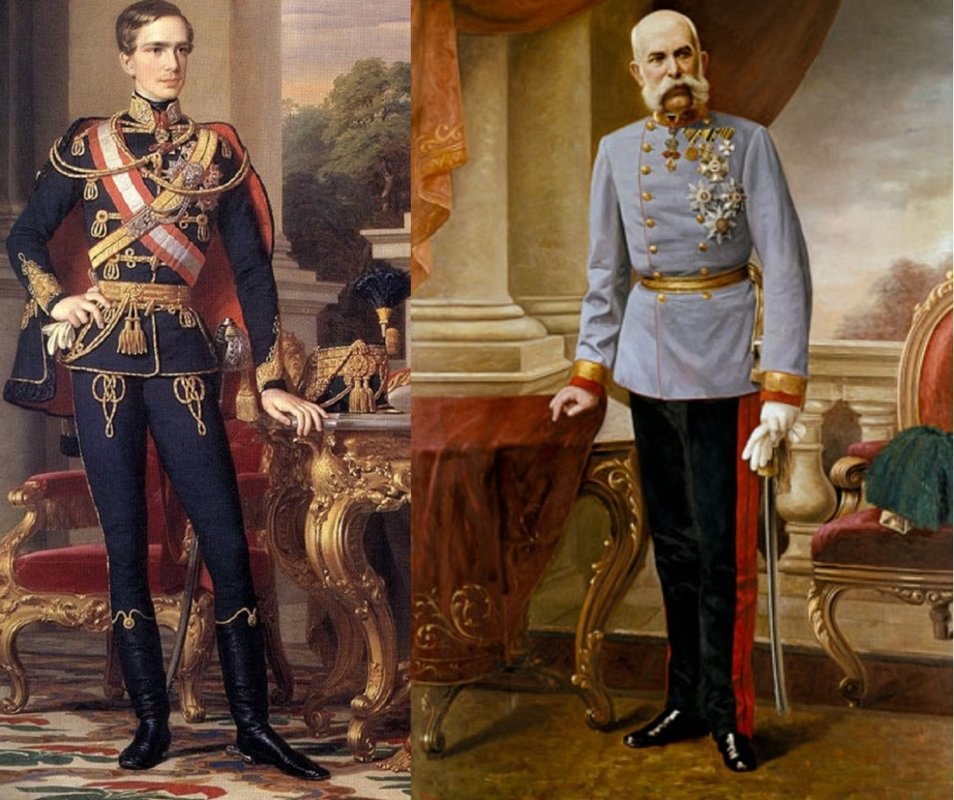
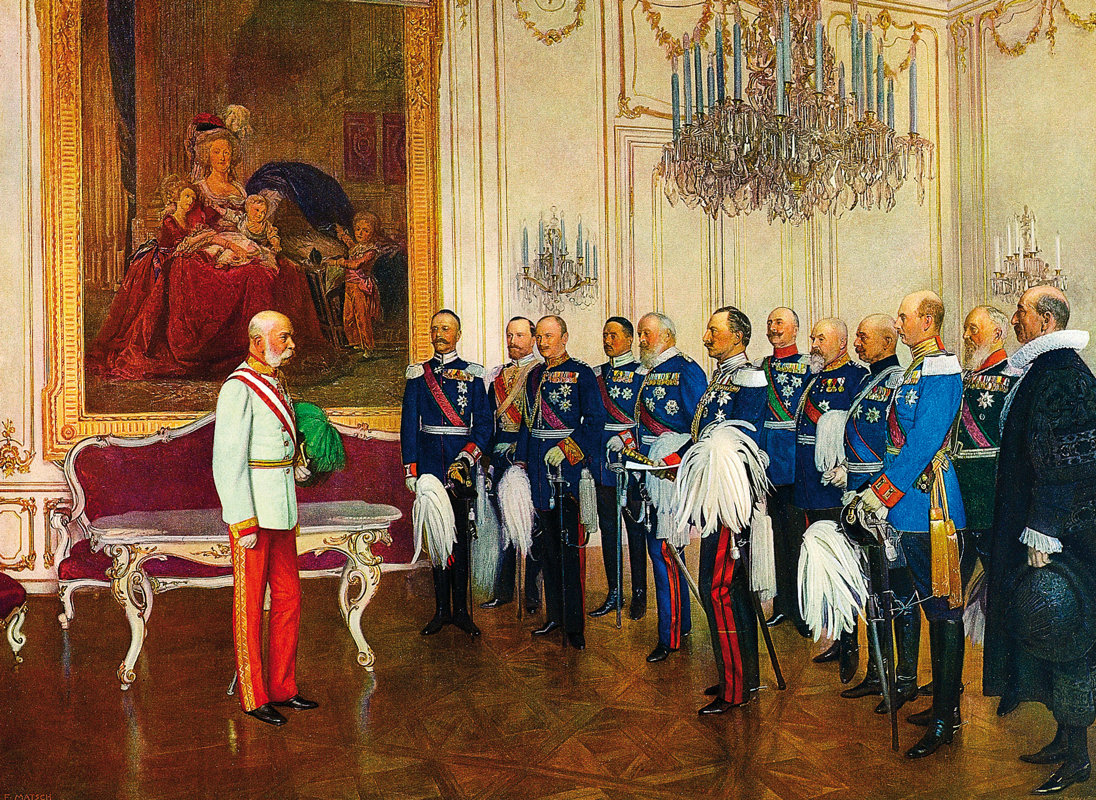 Franz Joseph I, Emperor,( 1830-1916),Franz Joseph was a deeply religious man and a frugal ascetic who slept on a simple military bed with a metal frame. Furthermore,Franz Joseph was reticent in private and public confining his remarks to his household phrase.At the age of eighteen he became Emperor of Austria Dec. 2, 1848, and King of Hungary June 8, 1867. Having endured innumerable crises in his 48 year reign, he realized that everything he had striven for was at risk as he lay dying in 1916
Franz Joseph I, Emperor,( 1830-1916),Franz Joseph was a deeply religious man and a frugal ascetic who slept on a simple military bed with a metal frame. Furthermore,Franz Joseph was reticent in private and public confining his remarks to his household phrase.At the age of eighteen he became Emperor of Austria Dec. 2, 1848, and King of Hungary June 8, 1867. Having endured innumerable crises in his 48 year reign, he realized that everything he had striven for was at risk as he lay dying in 1916
1854: The Wedding of Emperor Francis Joseph and Empress Sissi.On this day, Austrian Emperor Francis Joseph I and Bavarian princess Elisabeth, known by the nickname Sissi, were married in Vienna. The two of them met the year before. It is interesting that Elizabeth was Francis Joseph’s first cousin (their mothers were sisters).The mother of Francis Joseph wanted her son to marry Elizabeth’s older sister Helene, so she arranged an appointment in Bad Ischl, a famous summer resort in the Austrian Alps. Helene traveled with her mother and younger sister, 15-year-old Elizabeth.Francis Joseph was 23 years old at the time, and he instantly fell in love when he saw Elizabeth. He neglected to propose Helene and defiantly told his mother that he would either marry Elizabeth or remain single.Five days later, the engagement of Elizabeth and Emperor were announced. They were married on this day in 1854, when she was only 16 years old, in St. Augustine’s Church in Vienna.Imperial weddings were traditionally held in that church near the Viennese imperial court. Empress Maria Theresa and Maria Luisa (Napoleon’s second wife) were also married at that church.This dynastic church holds urns containing the hearts of as many as 54 former Habsburg rulers and archdukes.The feeling in the Imperial Court was that the young emperor should marry and produce heirs as soon as possible. Franz Joseph’s domineering mother considered several princesses as the future empress including Archduchess Elisabeth Franziska of Austria, Princess Anna of Prussia and Princess Sidonia of Saxony. However, Sophie wanted to forge a relationship with her familial House of Wittelsbach of Bavaria and the House of Habsburg-Lorraine. She arranged for a match between Franz Joseph and Helene, Duchess in Bavaria, the eldest daughter of her sister Ludovika of Bavaria and her husband Duke Maximilian Joseph in Bavaria. In 1853, Helene traveled with her mother and her younger sister Elisabeth, Duchess in Bavaria (Sisi) to the resort of Bad Ischl, Upper Austria to meet her cousin Franz Joseph with the hopes that she would become his bride. Instead, Franz Joseph fell in love with the 15-year-old Elisabeth. Franz Joseph told his mother that if he could not marry Elisabeth, he would not marry at all. Five days later their engagement was officially announced.Franz Joseph and Sisi were married on April 24, 1854 at the Augustinerkirche, the parish church of the imperial court of the Habsburgs, a short walk from Hofburg Palace in Vienna. The ceremony was conducted by Cardinal Joseph Othmar Rauscher, Archbishop of Vienna with 1,000 guests in attendance including 70 bishops.Helene (Nene), and Elizabeth (Sisi) are sisters; both are Duchesses of Bavaria. The elder sister, quiet and withdrawn, is the opposite of her younger sister who is a free spirit, independent and precocious. While one would like to enter a nunnery, the other has dreams of a bright and exciting future. Therefore, when Helene, 18, was summoned by her Aunt Sophie, The Archduchess of Austria, to marry her son Franz Joseph, 23, she was horrified and disappointed. Her sister, only 15, was exuberant and joyous. She could not wait to leave and go to Austria to be her sister’s confidante. When they arrived there, it was Sisi who suddenly felt herself attracted to one of the soldiers while Nene held back, joyless and filled with gloom and trepidation. When the soldier beheld Sisi, he too felt himself drawn to her. It turned out, it was not Sisi he was meant to be attracted to, but Nene. Unbeknownst to the women, the soldier was their cousin, 23 year old Franz Joseph, the Emperor himself.Although separated by several years, the two fell deeply in love, and although he was betrothed to her sister, they defied protocol and married. The author presents a picture of an Empress at once glorious and blissful and then an Empress who falls into a state of despair because she is shut out from the affairs of state and from the care and nurturing of her own children. Her husband and his mother have an unnatural affinity towards each other and an unbreakable bond of loyalty. She rarely sees him as there is war in the air, and she is desperately lonely. At 15, she thought she met the love of her life. At 16, she married him, and by the age of 17, she already had a child, a daughter soon to be followed by another. While it may in fact be true, that Sisi was too young to bear the burden of an empire and a family, she was never given the opportunity to even try. The Archduchess had never taken a liking to her and she immediately took each child and reared them. Sisi was powerless to defy her because Franz Joseph was in complete agreement with her.Feeling like an outsider, Sisi withdrew from court life whenever she could. Although she loved Franz Joseph completely, she felt neglected and alone. She was not Austrian. When, Princess Sophie, her eldest daughter succumbed to illness, she sank into a state of deep depression from which she did not recover for several years. She, too, became ill. She relinquished control of her younger daughter and removed herself from the family, returning to her home in Bavaria, to the Possenhofen Castle where she hoped to recover from her illness and depression. She remained away for an extended period of time, traveling and gaining strength, dreading her return to the place in Vienna where she felt she did not belong. When she did return to the Castle, she was soon pregnant once again, and this time she delivered a healthy boy, the Crown Prince Rudolph. Swiftly, with the birth of a son, the future Emperor, Sophie swept in and took over his care and education. Sisi had fulfilled her duty and had lost control of another child. She had given birth to the future monarch of the Habsburg Empire, an Empire that was swiftly diminishing in size due to misguided judgment and arrogance, leading to its defeat in war.During the not quite decade and a half that the book covers, from 1853 to 1867, the Empress met Count Andrassy, the beloved leader of Hungary. In her loneliness, she found him attractive, as he did her, and soon the two became smitten with each other, although they were often separated. Complicating matters further was the fact that Hungary was at odds with the Empire. The Hungarians wanted to detach themselves from Austrian rule and become a sovereign nation. When the differences were worked out, Elizabeth became the darling of the Hungarians. Since the Empress and the Count had a strong affinity for each other, tongues may have wagged about their relationship, including about her private efforts to achieve Hungarian independence from Austria. It was due to her work behind the scenes that war was avoided and Hungary remained a part of the Austrian Empire, albeit an independent part.
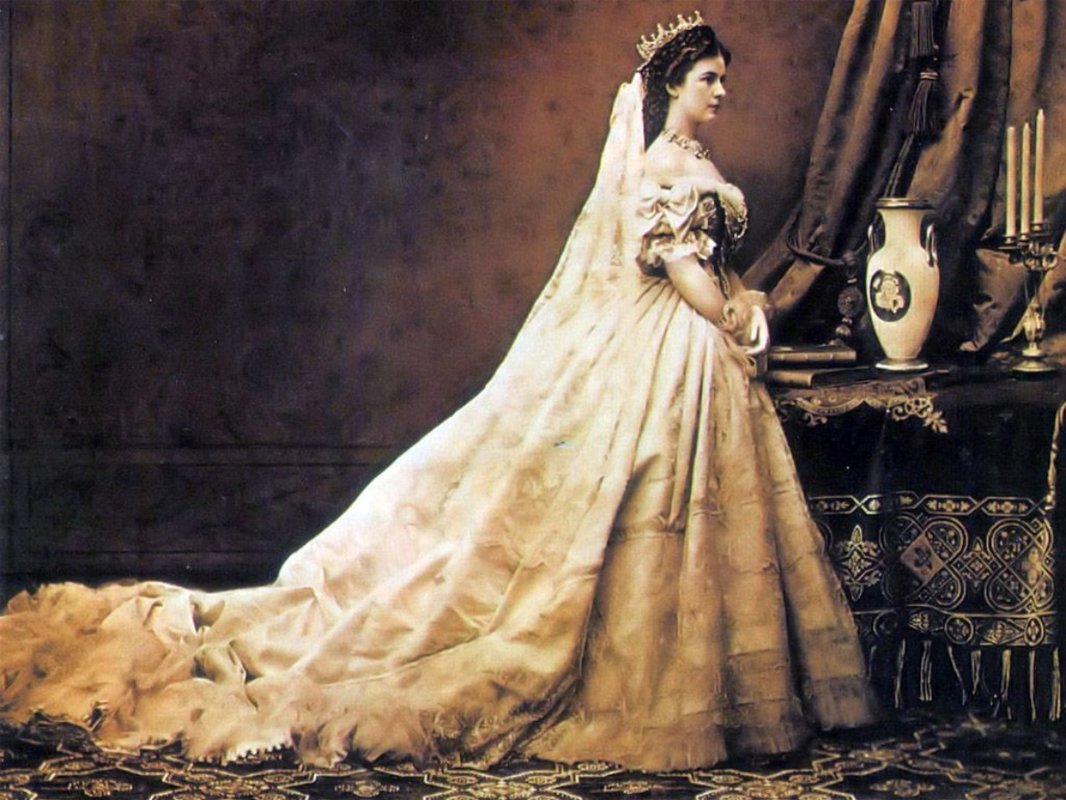 In 1853 Archduchess Sophie, the mother of Emperor Franz Joseph I of Austria decided that he should be married to his nice, Duchess Helene in Bavaria, the older sister of Sisi. Emperor Franz Joseph defied his dominant mother for the first time in his life and choose Sisi over Helene. Sisi was 15 years old at time of their engagement, which was announced five days after they met! Eight months later they were married in Vienna and Sisi became Kaiserin Elisabeth of Austria.
In 1853 Archduchess Sophie, the mother of Emperor Franz Joseph I of Austria decided that he should be married to his nice, Duchess Helene in Bavaria, the older sister of Sisi. Emperor Franz Joseph defied his dominant mother for the first time in his life and choose Sisi over Helene. Sisi was 15 years old at time of their engagement, which was announced five days after they met! Eight months later they were married in Vienna and Sisi became Kaiserin Elisabeth of Austria.
Born as Elisabeth Amalie Eugenie of Bavaria Empress Elisabeth, nicknamed Sissi, danced to the beat of her own drum, defying Habsburg protocol. The longest reigning Austrian empress a post she held for 44 years championed individual identity and independence as a free spirit who traveled the world and wrote poetry. Certainly the wife of Emperor Franz Joseph I came face-to-face with many a tragedy. Fate was unkind to her throughout her life, and she was not even spared a peaceful death. An Italian anarchist made sure of that. Concentrating on beauty and exercise all her life, she became a world-renowned icon.Sisi was born in Munich on December 24, 1837 as the fourth child of Duke Maximilian Joseph in Bavaria and Princess Ludovika, the daughter of Bavarian King Maximilian I and his second wife, Karolina von Baden. While growing up in Possenhofen Castle, she was carefree, living a leisurely lifestyle rather than being bogged down by rigid protocol. She did not even always attend her lessons.An introvert, Sisi went with her mother and older sister Helene to Bad Ischl in Austria, where Franz Joseph was to propose to Helene. Fate intervened, and Franz Joseph was immediately bewitched by Sisi instead. He told his mother, who had a strong hold on him, that he would never marry if he was not allowed to wed Sisi, then 15 years old. A few days later the two lovebirds announced their engagement. A mere eight months passed before the wedding took place at Vienna’s Augustinian Church on April 24, 1854. Soon riddled by health problems, Sisi became quickly disenchanted with court life, and an emotional distance between herself and her husband arose.Sisi also soon learned how malicious and domineering her mother-in-law could be. Disapproving of Sisi, Sophie named Sisi’s first child (1855-57) after herself and insisted on taking control of the child. Sisi did not have a say in her child’s upbringing. In fact, her first three children would be reared by her mother-in-law. When her firstborn died of typhus at age two, Sisi was devastated, falling into a deep depression. Her second child was also a daughter, named Archduchess Gisela of Austria (1856-1932). To the Habsburg clan’s relief, Sisi finally gave birth to the heir to the throne, Archduke and Crown Prince Rudolf (1858-1889). Sisi made sure she would remain in control of her fourth child’s upbringing, though. Marie Valerie (1868-1924) was born in Budapest, where she was also baptized. She was educated in the Hungarian language.Rudolf’s life would end tragically as the 30-year old committed suicide with his young mistress Mary Vetsera during 1889 at his hunting lodge in Mayerling. Some sources claim that the two devised a suicide pact after Rudolf’s father insisted they end their relationship. The heir’s death would have a significant influence on Austrian politics. After his suicide, Sisi only wore black, carrying a white parasol and hiding her face behind a fan.Sisi was obsessed with her beauty and exercise. She had her long, chestnut brown hair styled for three hours per day and used many beauty products. While her hairdresser combed her hair into lavish styles, Sisi studied languages, not only Hungarian but also ancient and modern Greek. (She was fluent in English and French, too.) She substituted a metal bedstead for a pillow in bed in order to improve her posture. Raw veal or crushed strawberries lined her facial mask, made of leather. At night she also put cloths soaked in vinegar above her hips so she would remain slim. Her hair was washed with a mixture of egg yolk and cognac once every two weeks.An exercise addict, she even had the Knights’ Hall of the Hofburg equipped as a gym. Horse-riding, hiking and gymnastics were her favorite sports, and she rode for hours daily, making quite a name for herself as an equestrian. Other interests included history, philosophy and literature, and she wrote poetry that was tinged with sadness and despair.ven though she had been warned of possible assassination attempts, Sisi traveled to Geneva in disguise during 1898 at the age of 60. It was a beautiful Indian summer day 117 years ago in Geneva, Switzerland, when Empress Elisabeth of Austria left the Hotel Beau-Rivage, where she spent a night incognito, to hurry to the steamship “Genève”. On Saturday, 10 September 1898, EmpressElisabeth was assassinated by Luigi Lucheni, an Italian anarchist. While she and her lady-in-waiting were walking along the promenade at 1:35 p.m. on Saturday, September 10, the 25-year old Italian anarchist Luigi Luccheni, who had previously worked as a valet to the Prince of Aragon, stabbed her with a sharpened needle file. Sisi collapsed and lost consciousness. She did make it to the boat she had planned to ride on but needed immediate medical attention, and the boat quickly returned to Geneva. By the time her body was laid down on the bed of her hotel room, it was too late. She had passed away at 2:10 p.m. When the emperor received news of her death, he was devastated as the two had developed a close friendship toward the end of Sisi’s life..Sissi was 15 when she married her cousin Francis Joseph of Austria.. She even fulfilled the most important duty of an empress, giving birth to Crown Prince Rudolf.The tragic event was well covered in the coeval press, as Elisabeth of Austria – also known as Sisi (not “Sissi”, like in the movies) was a mysterious fairy-tale princess. She was obsessively concerned about her beauty and spent several hours a day just to groom her knee-long hair. Sports and diets were her passion, and she loved to hike and to ride, but was so slim that she suffered from famine oedema.As a Bavarian princess who enjoyed a happy and unstrained childhood, the extremely strict court life in Vienna was a burden Elisabeth never got used to. She started to travel and wrote melancholic poems, and after the tragic death of her only son Rudolf she disappeared nearly completely from the Austrian court.When Elisabeth was sixty years old, she followed an invitation from the Rothschild family to Geneva. Together with her lady-in-waiting, the Hungarian Countess Irma Sztáray, she walked the short distance between the hotel and the pier without her entourage, despite warnings of possible assassination attempts.Luigi Lucheni, a poor man full of rage for the upper nobility, ran towards them as they walked by on the promenade and stabbed Elisabeth directly into her heart with a self-made weapon composed of a small sharp file. But neither the empress nor her lady-in-waiting realised what really happened. Thinking of a robbery attempt, they went on boarding the ship. A few minutes later, Elisabeth lost consciousness and died.She even fulfilled the most important duty of an empress, giving birth to Crown Prince Rudolf. However, she came increasingly into conflict with the conventions and rules of the Viennese court, personified by her mother-in-law.While a picture book princess on the outside her lifestyle soon revealed a deeply unhappy individual. On the one hand, the dazzling beauty with model figure was extremely sporty, body conscious, wrote poems and was adored by her husband. On the other hand, Empress Sissi showed little affection with her children, and never quite fitted into the stiff protocol of the Habsburg court.The only successful political intervention Sisi made with her husband was in the Austro-Hungarian Compromise in 1867. She staunchly took the side of the Hungarians. After Elisabeth’s and Franz Joseph’s coronation of king and queen of Austria-Hungary, Sissi was often referred to as Elizabeth of Hungary.
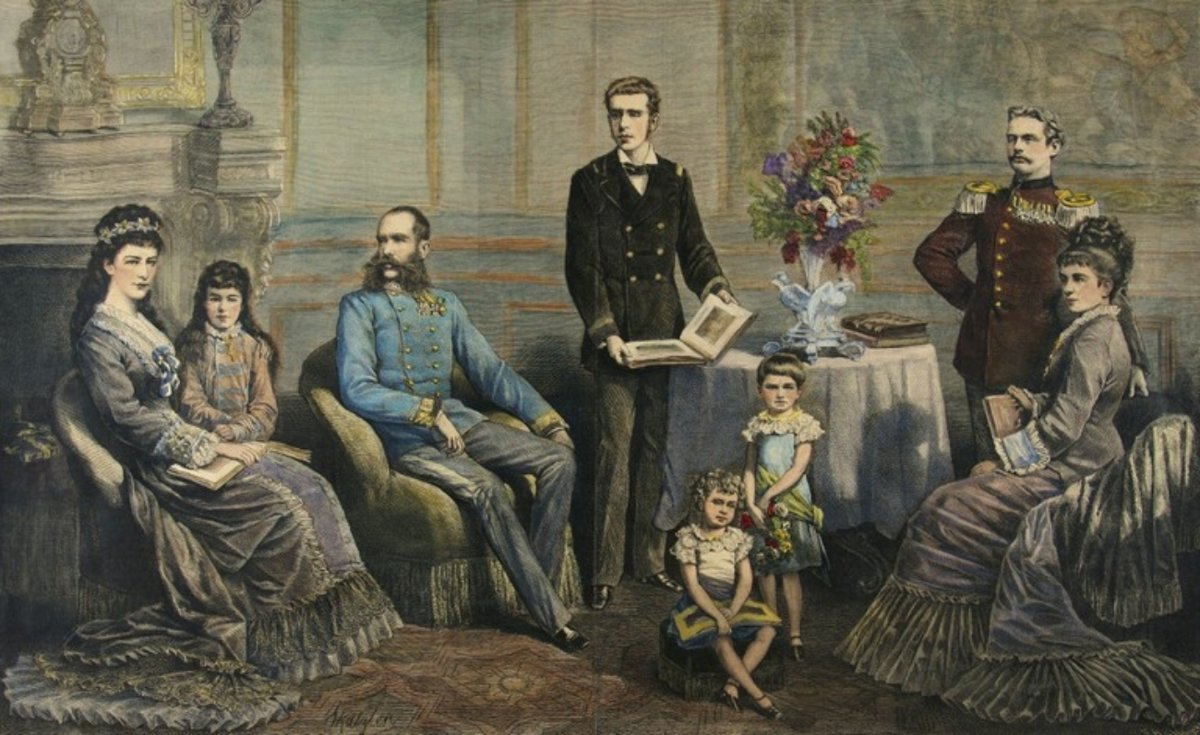 Sissi's family, from left: Sisi's daughter Marie Valerie, Franz Joseph I, Gisela's husband Leopold, Stephanie with her husband Rudolf From left (sit): Sissi and her daughter Gisela.This short happy period resulted in the birth of Archduchess Marie Valerie (22 April 1868). Sissi referred to her youngest daughter as the Hungarian child and had a solid relationship with her unlike with her other children.
Sissi's family, from left: Sisi's daughter Marie Valerie, Franz Joseph I, Gisela's husband Leopold, Stephanie with her husband Rudolf From left (sit): Sissi and her daughter Gisela.This short happy period resulted in the birth of Archduchess Marie Valerie (22 April 1868). Sissi referred to her youngest daughter as the Hungarian child and had a solid relationship with her unlike with her other children.
The Habsburgs of central Europe, in this respect, were just one among many rulers. Where they differed from their counterparts was in the longevity of their presence in the political affairs of the continent roughly 600 years reason enough to warrant a brief, but closer look at their approach to speaking for and developing policy for their lands.Habsburgs were serene in their belief that they were unique among their peoples and never modified that conviction. Such exclusivity, however, did not exempt them from concern about the quality of their government and their reputations as legitimate rulers. Beginning with the latter decades of the fifteenth century, they slowly established an array of offices and advisory positions to manage their expanding imperium and advise them on how to do it. The most successful of their rulers were on constant watch for men qualified to help them formulate policy, at first chiefly for foreign, military, and fiscal affairs, later in larger domestic concerns such as education and economic development. They readily criticized other members of the house for behaviors that threatened to compromise the hiring of good councilors. In 1547, Emperor Ferdinand I defined such people as men who were not liars and whose only advice was what pleased their employers. He chided his eldest son, the future Emperor Maximilian II for drinking and frivolousness, lapses that could decrease the young man’s reputation and the likelihood that good councilors would work for him. Without such persons to serve them, all rulers would be lost. Princes themselves had to practice truthfulness and moral stability if they hoped to find people with the same qualities. The eighteenth-century Empress Maria Theresa, who combined political smarts with a visceral sense of Habsburg greatness, believed that finding better ministers than those of her father, Emperor Charles VI, was the key to a productive and worthy reign.Indeed, so concerned were the Habsburgs with retaining successful ministers, that they often gave their advisors and military commanders as much credit for accomplishments as themselves. They preferred to turn leadership of their armies over to others and sometimes were absent from notable victories of their forces. Ferdinand I was soliciting last minute out in his Austrian provinces when the Ottoman armies were turned back from Vienna in 1529. The city’s fortified walls, along with its citizen militia, got the credit for the job. The seventeenth century Emperor Leopold I, whose watch oversaw a European coalition that drove the army of the Turkish sultan from Vienna in 1683, was not in the city when the enemy retreated. He and his pregnant empress had left for safer quarters. Though public celebrations acclaimed Leopold at first, it was one of his generals, Prince Eugene of Savoy, whose name would be became most enduringly associated with the victorious anti-Ottoman campaigns in the Balkans. It was through the diplomacy of Prince Klemens von Metternich at the Congress of Vienna in 1815 that the Habsburg reconstituted itself again following the Napoleonic Wars and not the negotiating talents of his employer, Emperor Francis I. In the peace that followed, Francis did become more assertive in domestic affairs which he ran as a quasi-police state. Nevertheless, though he never quite forgave Metternich’s promotion of the marriage of the upstart adventurer Napoleon I to the Habsburg emperor’s daughter, Archduchess Marie Louise, he had the good sense to leave foreign affairs to Metternich.Conversely, it was when the Habsburg rulers identified themselves too prominently with the causes of their state that their regimes and their house itself got into trouble. The reign of Emperor Joseph II (1780–1790) is a sad case in point. His cautious mother, Empress Maria Theresa chided him again and again for his reckless self-confidence and contempt for those who did not have his intellectual gifts and imagination, but to no avail. Afire with ambition to make his empire more efficient while freeing his peoples from medieval impediments such as church- promoted superstition, urban guild restraints on trade, and serfdom, he set up a workplace in a corridor of the Vienna Hofburg where people from all walks of life could see him pursuing their well-being. But long established traditional institutions of his empire, chiefly the church and noble estates blocked him at every turn. Indeed, at his death, very few of his most important initiatives had taken hold. Worse yet parts of the Habsburg realms were in open revolt against him.Joseph’s most lasting achievement was the establishment of a government bureaucracy that appointed and promoted members on the basis of quality of service and level of education. Nevertheless, while generally free of corruption, it had become increasingly lethargic by the end of the nineteenth century. Joseph Redlich, one of the empire’s closest students, once said that the civil service ruled the monarchy, and not the emperor. While the situation was generally recognized, neither Franz Joseph nor his various ministers had the political will and imagination to remedy it. Archduke Franz Ferdinand, assassinated in Sarajevo on 28 June, railed against the cumbersomeness of the system and promised to reform it once he became emperor. That toes might be trod upon did not trouble him in the least.His conviction that decisive personal action was required to keep the monarchy viable had a willing champion in Archduke Charles, who succeeded Franz Joseph as the last Emperor of Austria and King of Hungary in 1916. He visibly chafed against routine and the formalities of the Habsburg court and regularly developed policies and tactics without systematic input from his ministers.Charles consistently and publicly presented himself as the leader of his lands, only to bring himself, his house, and his lands much grief. In the midst of World War I, he foolishly allowed Habsburg war propagandists to present him as a benevolent father of his peoples. His public was not persuaded. Real patriarchs provided food and fuel for their children, rather than redirecting it to an unpopular war in far-away places. Franz Joseph had been anxious to keep his Empire intact and to guard over his subjects. Yet he could not sacrifice any of the power he had inherited. He died in Schönbrunn Palace on November 21, 1916 at age 86. His grand-nephew Karl took the throne for two years before Austro-Hungary perished. Franz Joseph is known to have been a stolid but hard-working, serious ruler. He was awarded numerous medals and honors during his lifetime. Habsburg bureaucracy is generally considered to be strict but honest and very well-organized. For instance, one of the reasons why Lombardy, Veneto and Tuscany are three successful Italian regions is that Austrians ruled there for some time.
 Emperor Franz Joseph at Empress Elisabeth’s coffin in the Imperial Crypt.In 1898, despite being warned about possible assassination attempts, Sisi traveled incognito to Geneva, Switzerland. On September 10, 1898 while walking to the shore of Lake Geneva to catch a steamship, Sisi was stabbed by a 25-year-old Italian anarchist Luigi Lucheni. The 60-year-old empress died shortly afterward. Franz Joseph never fully recovered from his wife’s death. Empress Elisabeth was buried in Franz Josephs Gruft (Franz Joseph’s Crypt) in the Imperial Crypt in Vienna where her son had been buried.
Emperor Franz Joseph at Empress Elisabeth’s coffin in the Imperial Crypt.In 1898, despite being warned about possible assassination attempts, Sisi traveled incognito to Geneva, Switzerland. On September 10, 1898 while walking to the shore of Lake Geneva to catch a steamship, Sisi was stabbed by a 25-year-old Italian anarchist Luigi Lucheni. The 60-year-old empress died shortly afterward. Franz Joseph never fully recovered from his wife’s death. Empress Elisabeth was buried in Franz Josephs Gruft (Franz Joseph’s Crypt) in the Imperial Crypt in Vienna where her son had been buried.
